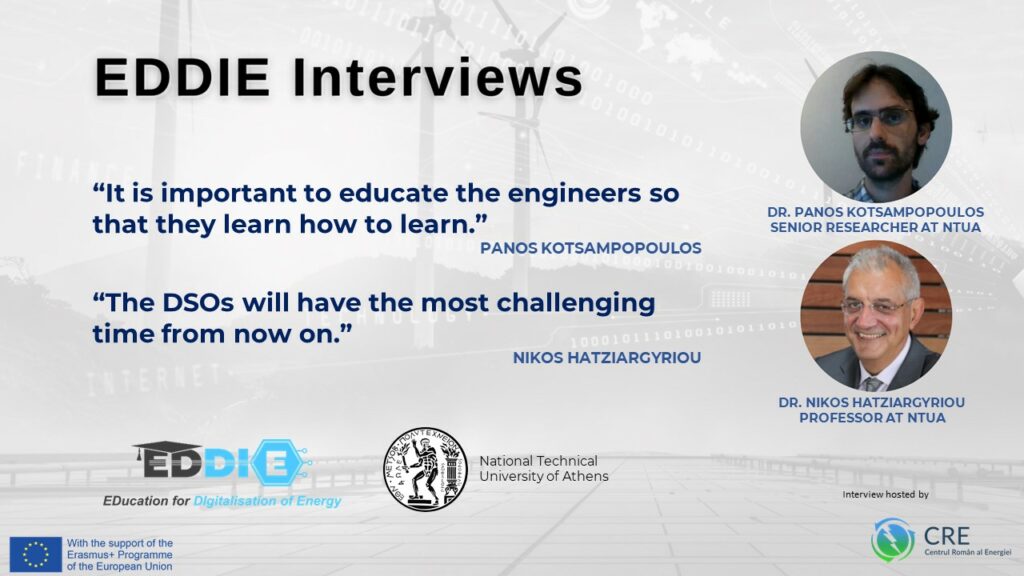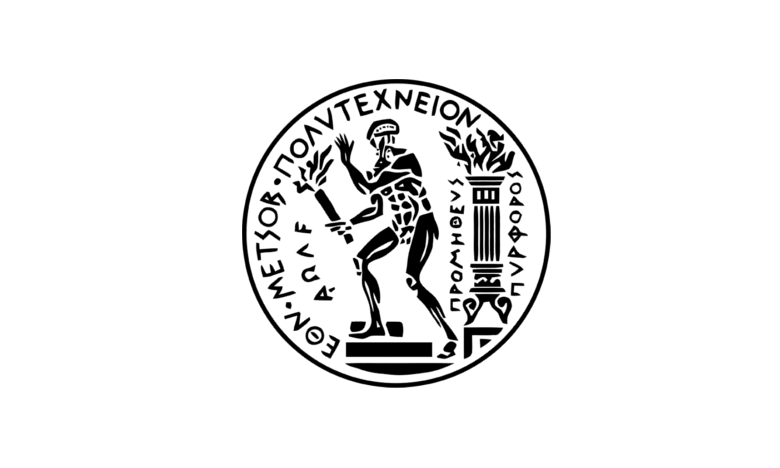Interview #2 - NTUA
Second guest – Partner NTUA University
Dr. Panos Kotsampopoulos – Senior Researcher at National Technical University of Athens, Editor at IEEE Open Access Journal of Power and Energy and Member of the Editorial Board of Energies MDPI
Dr. Nikos Hatziargyriou – Professor in Power Systems at the National Technical University of Athens and vice-chair of Governing Board of European Technology and Innovation Platform of Smart Networks for Energy Transition.

Mr. Nikos, in the context of the energy transition and its two main forces – Low Carbon Objectives & Digitalization, which type of energy industries/what group of stakeholders will have the most challenging time? And why?
The whole energy system is undergoing drastic changes. It must face this big new wave of renewable integration and for this reason the Distribution System Operators (DSOs) are the ones who will deal with a very complicated network. The system has to integrate also a large number of Distributed Energy Resources (DER), which includes generation, electric storage, electrical vehicles, active consumers which add complications for the operations.
To confront the difficulties you need digital tools, digitalization. Because you have a very large amount of information delivered by the sensors in the systems, by smart meters, etc., a lot of data need to be handled and organized so you can operate the system in the most efficient and active way, also exploiting these DER. So, the DSOs I think are the ones who will face the most challenges from now on.
Mr. Panos, as chair of the new IEEE Power & Energy Society Task Force “Innovative teaching methods for modern power and energy systems”, can you share some insights on the main actions on the list and how will them be addressed?
This Task Force (TF) is quite a new activity in the context of IEEE PES Power and Energy Education Committee and aims to investigate and to promote the use of innovative teaching methods and material in power and energy systems. It will address new trends in laboratory education, for example remote and virtual laboratories, augmented reality, hardware in the loop simulations and other approaches for finding ways to transform the traditional power energy classroom with blended learning, digital tools combined with traditional methods. Advanced teaching and educational methods will be also investigated based on the engineering education research like problem-based learning, experiential learning, etc.
The main aim of this TF is to create a comprehensive IEEE PES technical report that will be published in 2022. This is an open activity where we welcome additional participation.
From your point of view, what are the new skills for a traditional power engineer in the new paradigm of digitalization and what are the arguments?
Mr. Nikos: Traditional power engineers now need to get many more skills than before while developing knowledge in new fields that were not initial included in the curriculum of the traditional power engineering. I mention ICT, telecommunication, informatics; data handling, communication, and data bases; AI, IOT, big data and cybersecurity. At the same time, the systems are currently transformed by the distributed generation. So, the system is full of power electronics at every level, either transmission or distribution. Because you have power electronic interfaces of the distributed generations, and high-voltage DC systems and low-voltage DC systems, power electronics are very important.
Another extremely important development is the presence of more and more decentralization and therefore, decentralized techniques and decentralized control is critical. We must take decisions without owning the full knowledge of the systems, with the partial view instead. So, this also requires new skills.
There are plenty of challenges and many new things are happening in the power system and power systems engineers need to be differently trained now.
Mr. Panos: A difficult aspect is the complexity of intelligent energy systems, so nowadays it’s a must to know many different things and to have a broad understanding of topics from various domains (electric power, heat, oil and gas, markets, and obviously, most important, ICT).
We need a multi-disciplinary approach and the possibility of understanding the interactions between the different domains.
In this direction it is important to educate the engineers so that they learn how to learn.
In the framework of the EDDIE project we have asked the questions that you asked us to the industry, by addressing many European companies and they have reported skill needs and challenges that they are facing. Among their problems is the employees’ lack of skills. In EDDIE we are trying to address this issue. Moreover, specific skill needs like big data analysis, predictive modelling, data mining, mathematical optimisation and many other will be presented in the EDDIE deliverable in a couple of months.
What are you doing when you are not working?
Mr. Nikos: I like going to the mountains, swimming and mostly I like socializing – and that is what I really miss these days. I rediscovered reading, watching movies and listening to music, but I really miss people and discussion, drinks and good dinners in real life.
Mr. Panos: I am now focusing on my family, because I have a young daughter and when I have free time, I spent it mostly with her. We go to walks, to mountains, to swimming. She is also a very good hairdresser, so I need to attend these sessions.
And I also play guitar – it is something that I enjoy while trying to improve my skills.




